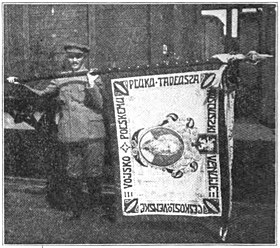Steamship Zaca which sailed from New York for Hamburg early in September carried among its cargo a gift from the American Red Cross to the Czechoslovak Red Cross. There were 405 bales of used clothing and 78 bags of used shoes, weighing togethere 72,285 lbs.; that was the least valuable part of the shipment, for the Red Cross donated 1710 cases of woolen knit goods, all new, and 77 cases of miscellaneous cotton piece goods, weighing 340,300 lbs. The total value of the shipment exceeds one million dollars, being thus the largest gift sent so far from America to the Czechoslovak Republic. The clothing will be divided equally between Czechs and Slovaks under the supervision of the Prague representative of American Red Cross. One condition of the gift was that the Czechoslovak organization in America pay for the cost of transportation, which was cheerfully done by the Czechoslovak National Council through Mrs. Libuše Moták, director of relief work.
How I Got Across
By MAJOR JOHN ŠIPEK.
I served in the “glorious” Austrian Army from the beginning of the war until March 2, 1915 as first lieutenant. In the spring of 1915 I commanded a company in a Tyrolean regiment, composed of Italians and Germans, the Italians being about twice as numerous as the Germans. The men liked me, and the Italians saw in the Czech officer a friend. Especially after April, when Italy declared war on Austria-Hungary, we seemed to understand each other well. Now and then one of the Italian boys remarked with a wink that now we would surely win the war soon, but of course I would only say with a smile that we would try to do so. In the mean time the Russians were falling back before us and there seemed little chance of either winning the war in the sense in which we understood that term, or crossing over to the other side. Finally the right opportunity turned up in early June. Our positions were on the edge of a wood; about 250 yards back of us was a railroad running through this wood. At seven o’clock in the morning the Russians began bombarding our position, but they did not seem to shoot well, for the shrapnels were bursting around the railroad tracks. The Germans in my company made jokes about Russian marksmanship, but the Italians were sore and kept glancing at me as if to ask what I made of it. The shots were not many and soon they ceased; it seemed as if the Russian artillerymen had been merely trying to decide a bet, whether they could hit the railroad. About eight o’clock the noise ceased and a grateful quiet prevailed in the trenches. As the sun ascended higher, we took things easier, for it grew to be very hot. Then about noon all of a sudden a tremendous bombardment hit the Austro-German trenches. Our sector was not affected, the drum fire seemed to be aimed at our left, some six miles away from us. That woke us up and we looked anxiously at the Russian line ahead to guess what it all meant. But no motion could be discerned in the trenches opposite. You could read the question on the faces of my boys: what does it all mean? I could not guess as yet myself, but I was sure that something was going on that would soon involve our own sector. The bombardment to the left was growing in intensity, but not a shot was fired against us. I picked

Flag presented by Czechoslovaks in Siberia to the Kosciuszko Regiment of their Polish Comrades.
up the telephone connecting the sector with the regimental headquarters and asked what the Russian drum fire meant. But the officers at regimental headquarters were no wiser, and an other hour passed in uneasy wondering.
Suddenly I heard the shrill whistle of shrapnels over our head and immediately the shells were bursting on the track in the rear of us. In the Russian trenches there was still no sign of
